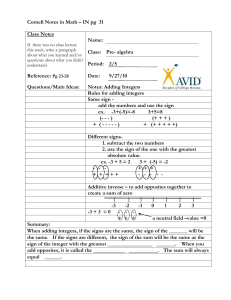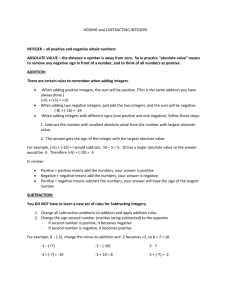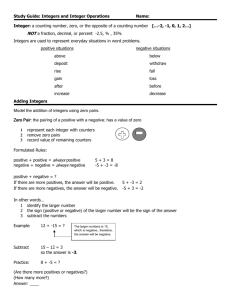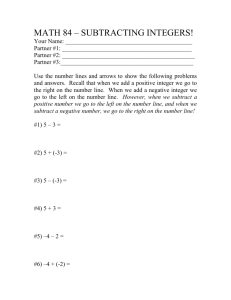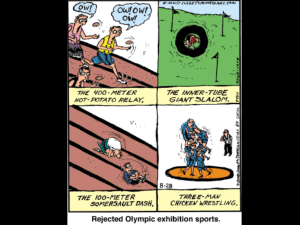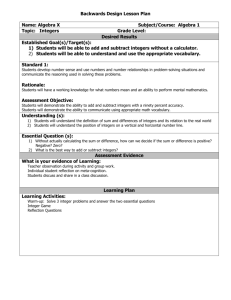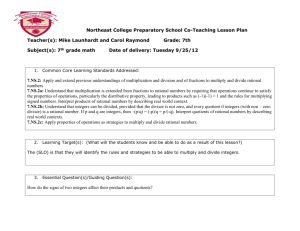Lesson plan for adding and sub integers day 3
advertisement
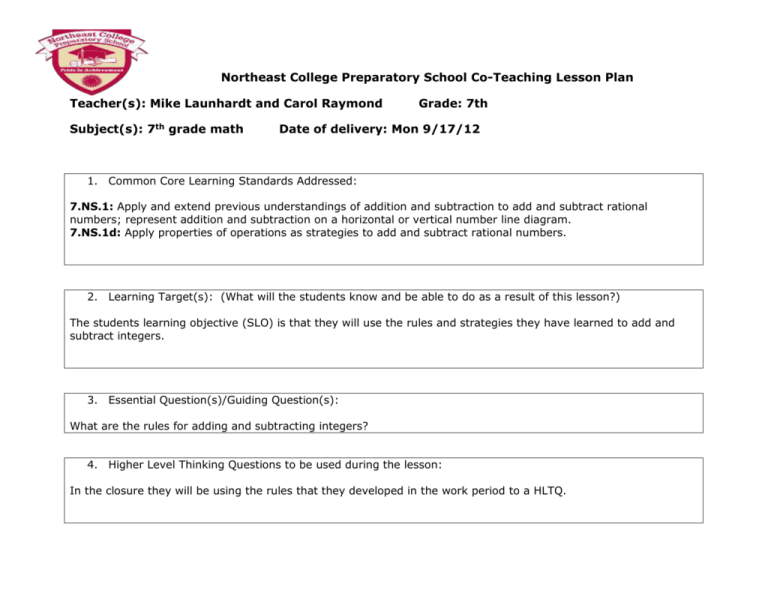
Northeast College Preparatory School Co-Teaching Lesson Plan Teacher(s): Mike Launhardt and Carol Raymond Subject(s): 7th grade math Grade: 7th Date of delivery: Mon 9/17/12 1. Common Core Learning Standards Addressed: 7.NS.1: Apply and extend previous understandings of addition and subtraction to add and subtract rational numbers; represent addition and subtraction on a horizontal or vertical number line diagram. 7.NS.1d: Apply properties of operations as strategies to add and subtract rational numbers. 2. Learning Target(s): (What will the students know and be able to do as a result of this lesson?) The students learning objective (SLO) is that they will use the rules and strategies they have learned to add and subtract integers. 3. Essential Question(s)/Guiding Question(s): What are the rules for adding and subtracting integers? 4. Higher Level Thinking Questions to be used during the lesson: In the closure they will be using the rules that they developed in the work period to a HLTQ. 5. Bridge/Connections/Hook: State what is wrong with each student’s explanation and then correct the mistakes. 1. 2 – 7 = ? Student: When I was in kindergarten, I didn’t think you could do this problem. Now I know this is the same thing as 7 – 2, so the answer is 5. 2. -3 – 5 = ? Student: (-3 – 5) is -2, because you just subtract. General Education Teacher I will be checking for homework and doing attendance while students work on problems. Also answering individual Questions Special Education Teacher Monitoring the class and guiding the students using thought provoking questions to discover the answer for themselves Students They will be working in their notebook on the Bridge and have their homework out to check for completion. 6. Materials/Resources/Technology Integration: RC handouts 7. Mini Lesson/Process/Procedure: Review Integer rules. You may give the adding and subtracting integers fact sheet to the students if you wish. 1) Add integers with the same sign, add their absolute values. The sum is: Positive if both integers are positive Negative if both integers are negative a. 7+ 4 = 11 b. -7 + (-4) = -11 2) To add integers with different signs, subtract their absolute values and keep the sign of the number with the largest absolute value. The sum is: Positive if the positive integer’s absolute value is greater. Negative if the negative integer’s absolute value is greater. a. 9 + (-4) = 5 b. -9 + 4 = -5 3) To subtract an integer, add its opposite (rewrite as an addition problem) and follow addition rules. a. 4 – 9 = 4 + (-9) = -5 b. 7 – (-10) = 7 + 10 = 17 To add and subtract more than two integers, 1. Change all subtractions to addition problem 2. Add all positive values, add all negative values 3. Combine the results 6 – 4 – (-7) + (-5) 6 + (-4) + 7 + (-5) 6 + 7 + (-4) + (-5) 13 + (-9) 4 General Education Teacher Delivering the material in an engaging manner. Adjusting the lesson as needed based student’s needs. Special Education Teacher Help students stay focused during the mini Lesson. Circulating around the room and attending to needs of the students. Students Students will record any vocabulary in their notebook try the guided practice problems and volunteer to do on the smart board explaining what they are doing. 8. Work Time/Activities/Tasks: (What learning experiences will students engage in? How will you use these learning experiences or their student products as formative assessment opportunities?) Have students do work on these individually and then share answers with their partner. 6 (8) _____ 1.) 3.) (15) (8) _____ 5.) 14 (22) _____ 7.) 21 21 _____ 9.) 57 (23) _______ 11.) 4 9 (8) _______ 13.) 10 6 (9) _______ 2.) 23 (15) ______ 4.) 7 (7) ______ 6.) 23 (16) _____ 8.) 56 42 ______ 10.) 12 (7) 5 _______ 12.) 13 (8) (5) _______ 14.) 22 (4) (15) _______ 15.) 7 (3) 5 _______ 17.) -7 + (-4) - 5 + 3 = _______ 16.) 6 (4) (3) _______ 18.) 6 - (-5) + (-3) + 4 = _______ General Education Teacher Will instruct the students how to pair up giving expectations for pair work letting them know that they will be accountable for their work. When work time is finished the will share any findings or questions. Also go around the room and give guiding questions to help them through unfamiliar topics. Special Education Teacher Will also help students stay focused during the mini Lesson. Circulating around the room and attending to needs of the students. Students Will start to group in pairs and listen for instruction on expectations for pair work. Then they will work on questions attached using expectations for pair work and share their findings on the smart board. 9. Access for All: (How will you ensure that all students have access to and are able to engage appropriately in this lesson? Consider all aspects of student diversity.) The students will work individually for a period of time and then pair up to discuss work. This will enable students to collaborate and work together to understand the topic. They will be asked to share their findings with the class and explain their thought process of why they answered the way they did. 10. What specific Special Education Accommodations/Modifications were made for made? (specify students) Students as needed will get guided help from both teachers based on need during the work period. 11. Management/Social Considerations: During the lesson we will review the expectations of how to learn and take notes. During the work time we will review how to be accountable and allow them to work cooperatively to achieve the same goal of completing the worksheet. We will also use PRIDE Bucks to reinforce school pride. 12. Homework/Extensions/Enrichment: 1. Calculate an answer for each letter a. -5 – 8 + (-1) b. -8 – 5 + (-2) c. -5 – (-8) + (-2) – 4 d. 4 – 5 + 6 2. True or false? a. 3 – (-5) = -3 – (-5) b. 3 + (-5) = 3 – (-5) c. 5 + (-3) = 5 – 3 3. Find the values of each pair of expressions. a. -12 + (-4 + 9) [-12 + (-4)] + 9 b. (14 – 20) - 23 14 – (20 – 23) 13. Formative Assessment Criteria for Success: (How will you and your students know if they have successfully met the outcomes? What specific criteria will be met in a successful product/process? What does success on this lesson’s outcomes look like?) Choose select questions and have students show their work on the smart board and discuss if the answer was achieved correctly and how do we know this to be true. Also during the work time walk around the class and monitor students work and guide them in the way they are working. Also by answering the closure. 14. What adjustments will be made for students that do not meet the Criteria for Success? Questions will be answered the next day about any problems they may have had problems with keeping in mind that we may have to revisit and reteach some of the mini lesson. Reflections: 15. How does this lesson reflect academic rigor? We will discuss with 7th grade vertical team. 16. How does this lesson cognitively engage students? We will discuss with 7th grade vertical team 17. How does this lesson engage students in collaborative learning and enhance their collaborative learning skills? We will discuss with 7th grade vertical team
